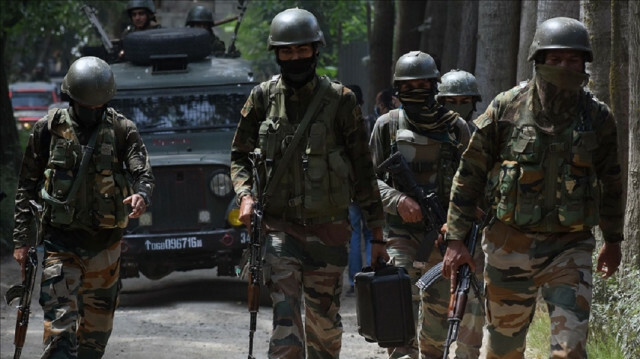
Despite past heavy reliance on China, South Asian nation now expanding defense ties with Russia, UK, India, Turkey, Germany
Bangladesh has been modernizing its armed forces by maintaining a balanced approach, overcoming its dependency on any single other country or the dominance of great powers, say officials as well as geopolitical analysts.
"For a long time, Bangladesh has been heavily reliant on China for military weaponry since its independence in 1971. However, the situation has changed, and Bangladesh is now purchasing military equipment from several countries," A L M Fazlur Rahman, a defense analyst and former director general of the Bangladesh Border Guard, told Anadolu Agency.
According to official sources, the country launched a megaproject in 2009, dubbed Forces Goal 2030, with the goal of modernizing its military forces by 2030.
In 2017, the overcrowded delta nation of nearly 170 million people revamped the initiative, focusing on modernizing and strengthening its army, navy, and air forces with cutting-edge technology.
Underlining that the project is "time-befitting," Rahman added: "Dhaka must have the fortitude to overcome the domination of any particular external force."
Over the last few decades, the country has greatly expanded its defense cooperation with Russia, the UK, India, Turkey, and even Germany, besides China, the sources say.
Despite diplomatic pressure by neighboring India, Bangladesh purchased two submarines from China in 2016 for the first time in its history.
In retaliation, India even provided Myanmar with a Russian-made Kilo-class submarine in October last year, Rahman pointed out.
The country also announced its purchase of five British-made naval ships in November this year.
Foreign Minister A K Abdul Momen said the purchase would be used to monitor and protect the "huge sea boundaries from others who enter Bangladeshi maritime territories for fishing or other activities."
- Boosting Turkey-Bangladesh defense ties
In recent years, the country has turned its eyes to its Muslim long-time ally Turkey for defense cooperation on a bigger scale.
Turkish Ambassador in Dhaka Mustafa Osman Turan recently said Ankara was prepared to offer Dhaka need-based defense support and military hardware without conditions, similar to what multi-launcher rockets have already delivered. He also said Turkey was open to cooperative ventures in shipbuilding, not only for the military but also for civilian purposes, as well.
Preferring not to be named as he is not authorized to talk to the media, an army official told Anadolu Agency that his country was impressed by Turkish competence in making drones and military tanks. "We hope to receive huge support from Turkey in modernizing our defense sector."
Both countries are also interested in boosting defense cooperation with combined training of their armed forces.
Last week, Adm. Adnan Ozbal, the head of the Turkish Navy, and his Bangladeshi counterpart Adm. M Shaheen Iqbal met in Dhaka for a courtesy call to discuss the topic while Ozbal was on a three-day official visit to Bangladesh.
The naval chiefs discussed an "increasing of different training activities for the development of professional skills and other bilateral issues," said a media statement issued by Bangladesh armed forces' mouthpiece, Inter-Services Public Relations (ISPR).
- National defense policy
Bangladesh's original national defense policy had been issued in 1974 by Bangabandhu Sheikh Mujibur Rahman, the country's founding leader, and was updated in 2018 by the government led by Rahman's daughter, Sheikh Hasina, who is now the country's fourth-term premier.
Hasina also said multiple times that the country's armed forces were being modernized to keep up with developed nations as part of a diplomatic policy of "friendship to all and malice to none."
"We have added the modern infantry gazette, state-of-the-art weapons, aircraft and helicopters, various modern engineering equipment, sky-destroying automatic SHORAD (Short-Range Air Defense), VSHORAD (Very Short-Range Air Defense), state-of-the-art Oerlikon air defense systems, etc., to the armed forces," state-run media quoted the prime minister as saying while addressing a military program in Dhaka last week.
Claiming that new naval and submarine bases were in development, she added that the country's naval forces had state-of-the-art corvettes, frigates, submarines, and maritime helicopters, as well as an elite operational unit known as SWADS (Special Warfare Diving and Salvage).
"State-of-the-art fighter jets, transport aircraft, helicopters, high-powered air-defense radar, and surface-to-air missiles have been included in the Air Force," Hasina stated.
After coming to power in 1996, Hasina and her successive government also bought eight Mig-29 jet fighters from Russia, despite criticism over cost and maintenance.
- Geographical location in favor
ISPR Director Lt. Col. Abdullah Ibn Zaid told Anadolu Agency over the phone that the government is gradually modernizing its military forces in light of the country's defense policy of 1974.
"Our main purpose is to develop a modern defense force, which does not imply that we are showing strength," Zaid said, adding that the country is on track to achieve its 2030 goal of developing a modern defense system.
"I will not disclose details of our military hardware procurement from different countries," he said, adding: "But I can say we are modernizing our defense forces."
However, former army officer Fazlur Rahman told Anadolu Agency that Bangladesh's geographical location favors extending defense cooperation with two Asian giants at the same time -- China and India.
"Because we are sandwiched between two major Asian players, I frequently refer to Bangladesh as a middle kingdom. So, if we are capable of effectively managing these two powers, we can benefit from both countries, and it also applies to the defense sector," he argued.

